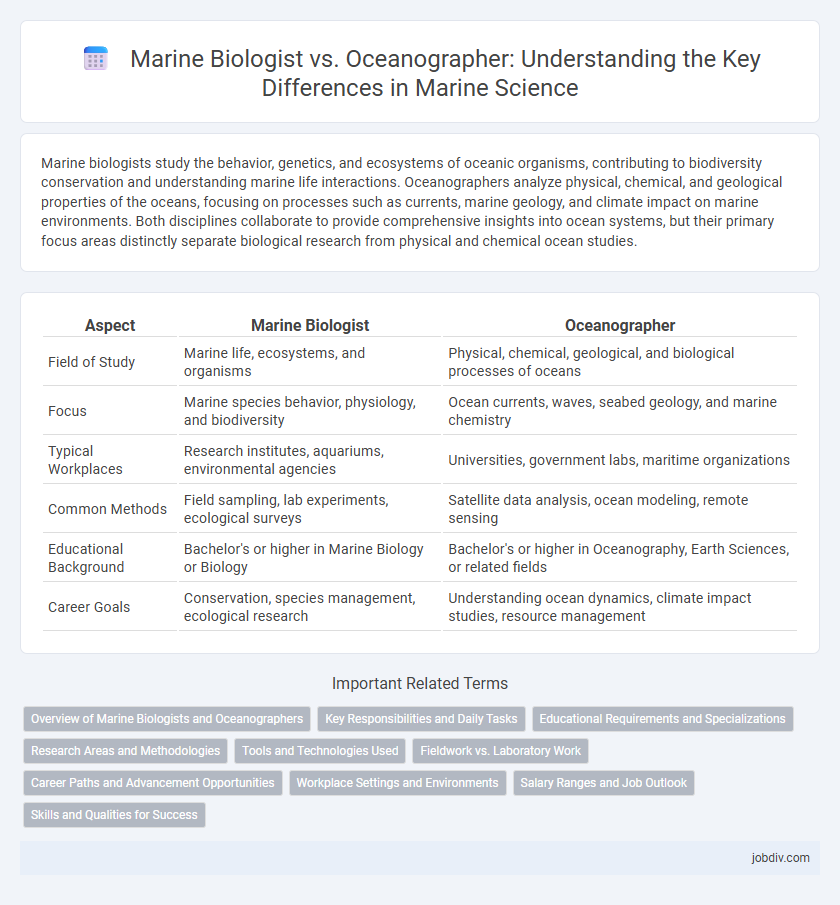Marine biologists study the behavior, genetics, and ecosystems of oceanic organisms, contributing to biodiversity conservation and understanding marine life interactions. Oceanographers analyze physical, chemical, and geological properties of the oceans, focusing on processes such as currents, marine geology, and climate impact on marine environments. Both disciplines collaborate to provide comprehensive insights into ocean systems, but their primary focus areas distinctly separate biological research from physical and chemical ocean studies.
Table of Comparison
| Aspect | Marine Biologist | Oceanographer |
|---|---|---|
| Field of Study | Marine life, ecosystems, and organisms | Physical, chemical, geological, and biological processes of oceans |
| Focus | Marine species behavior, physiology, and biodiversity | Ocean currents, waves, seabed geology, and marine chemistry |
| Typical Workplaces | Research institutes, aquariums, environmental agencies | Universities, government labs, maritime organizations |
| Common Methods | Field sampling, lab experiments, ecological surveys | Satellite data analysis, ocean modeling, remote sensing |
| Educational Background | Bachelor's or higher in Marine Biology or Biology | Bachelor's or higher in Oceanography, Earth Sciences, or related fields |
| Career Goals | Conservation, species management, ecological research | Understanding ocean dynamics, climate impact studies, resource management |
Overview of Marine Biologists and Oceanographers
Marine biologists study the behavior, genetics, and ecology of marine organisms, analyzing their interactions within ecosystems to understand biodiversity and species health. Oceanographers examine the physical, chemical, geological, and biological aspects of the ocean, focusing on processes like currents, marine geology, and ocean-atmosphere interactions to understand ocean dynamics. Both disciplines collaborate to contribute critical data for marine conservation, climate change research, and resource management.
Key Responsibilities and Daily Tasks
Marine biologists specialize in studying the behavior, genetics, and ecosystems of marine organisms, conducting field research to collect biological samples and analyzing data related to marine life health and biodiversity. Oceanographers focus on physical and chemical properties of ocean water, ocean currents, and geological formations beneath the ocean floor, utilizing advanced instruments to monitor marine environments and model oceanic processes. Both roles require extensive data collection and analysis but differ in their emphasis on living organisms versus physical ocean systems.
Educational Requirements and Specializations
Marine biologists typically require a bachelor's degree in marine biology, biology, or a related life science, with advanced degrees often specializing in areas such as marine ecology, physiology, or conservation. Oceanographers usually pursue degrees in oceanography, earth sciences, or environmental science, focusing their specialization on physical oceanography, chemical oceanography, geological oceanography, or biological oceanography. Both professions demand strong foundations in mathematics, chemistry, and biology, but oceanography leans more toward interdisciplinary studies involving geology and physics.
Research Areas and Methodologies
Marine biologists specialize in studying marine organisms, their behaviors, and ecosystems, utilizing field observations, laboratory experiments, and genetic analysis to understand biodiversity and species interactions. Oceanographers investigate physical, chemical, and geological properties of oceans, employing remote sensing, water sampling, and oceanographic modeling to analyze currents, temperature, and marine chemistry. Both disciplines use advanced technologies like underwater drones and satellite data, but marine biology centers on living organisms while oceanography emphasizes environmental and physical ocean processes.
Tools and Technologies Used
Marine biologists utilize tools such as underwater cameras, scuba gear, and genetic analysis equipment to study marine life behaviors and ecosystems. Oceanographers employ advanced technologies including remote sensing satellites, autonomous underwater vehicles (AUVs), and CTD sensors to examine physical, chemical, and geological ocean properties. Both fields increasingly rely on data modeling software and GIS mapping to analyze and visualize marine environments accurately.
Fieldwork vs. Laboratory Work
Marine biologists primarily engage in fieldwork by observing and collecting marine organisms in their natural habitats, often aboard research vessels or coastal sites. Oceanographers focus more on laboratory analysis and data modeling to study ocean conditions, currents, and chemical compositions. Both disciplines rely on a combination of field observations and lab experiments, but marine biology emphasizes ecological interactions while oceanography centers on physical and chemical ocean processes.
Career Paths and Advancement Opportunities
Marine biologists specialize in studying marine organisms and ecosystems, often advancing through research positions, academic roles, or environmental consultancy. Oceanographers examine physical, chemical, geological, and biological aspects of oceans, with career growth in scientific institutions, government agencies, or marine technology firms. Both fields offer interdisciplinary advancement opportunities, but oceanographers may have broader roles in climate science and resource management, while marine biologists often focus on conservation and biodiversity projects.
Workplace Settings and Environments
Marine biologists primarily conduct research in coastal laboratories, research vessels, and underwater habitats, studying marine organisms and ecosystems. Oceanographers work in a broader range of environments including ship-based expeditions, deep-sea submersibles, and remote sensing stations, focusing on physical, chemical, and geological ocean processes. Both specialists often collaborate in fieldwork settings, but marine biologists emphasize biological aspects while oceanographers concentrate on the ocean's physical environment.
Salary Ranges and Job Outlook
Marine biologists typically earn salaries ranging from $50,000 to $90,000 annually, depending on experience and education level, while oceanographers have a slightly higher range, often between $60,000 and $100,000 per year. Job outlook for both professions is projected to grow by about 5-7% over the next decade due to increasing environmental research funding and marine conservation efforts. Employment opportunities are concentrated in government agencies, research institutions, and environmental consulting firms.
Skills and Qualities for Success
Marine biologists excel in skills such as species identification, ecological data analysis, and underwater fieldwork, emphasizing biological systems and organism behavior. Oceanographers possess expertise in physical ocean processes, chemical measurements, and geospatial mapping, requiring strong analytical and technical abilities in instrumentation. Both disciplines demand critical thinking, adaptability, and proficiency in scientific communication to drive successful research outcomes.
Marine Biologist vs Oceanographer Infographic

 jobdiv.com
jobdiv.com